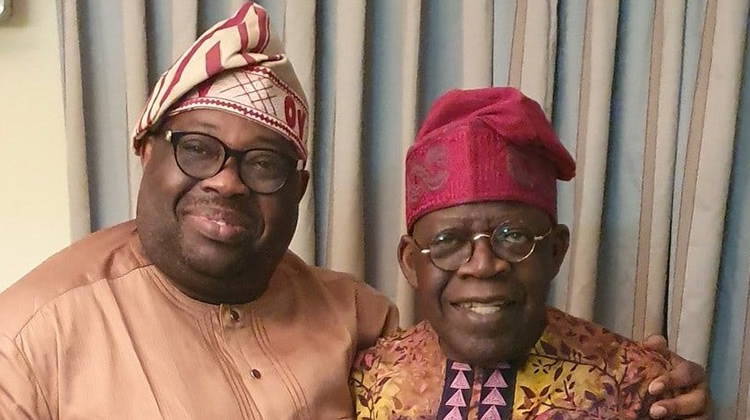Breaking
Protest: “You’re Responsible for This” – Dele Momodu Criticizes Tinubu

The recent protests in Nigeria have captured significant attention, both domestically and internationally. One of the most poignant criticisms during these protests came from Dele Momodu, a renowned journalist, publisher, and former presidential candidate.
His pointed critique, encapsulated in the phrase “You’re Responsible for This,” was directed squarely at President Bola Ahmed Tinubu. This statement reflects not only the frustration and disappointment of the Nigerian populace but also highlights the broader socio-political issues plaguing the nation.
To understand the gravity of Momodu’s criticism, it’s essential to contextualize the current state of Nigeria under Tinubu’s administration. Tinubu, a veteran politician and former governor of Lagos State, assumed the presidency with high expectations from various quarters. However, his tenure has been marred by several controversial policies and actions that have exacerbated existing problems rather than resolving them.
One of the primary issues that sparked the protests is the deteriorating economic situation. Nigeria, Africa’s largest economy, has been struggling with significant economic challenges, including inflation, unemployment, and a devaluing currency. The ordinary Nigerian is finding it increasingly difficult to afford basic necessities, and the cost of living has skyrocketed. Despite promises of economic reforms and development, many feel that Tinubu’s policies have not only fallen short but have also disproportionately benefited the elite at the expense of the general populace. Momodu’s critique underscores this sentiment, highlighting the growing discontent among Nigerians who feel betrayed by their leadership.
Another critical area of concern is security. Nigeria has been grappling with various security challenges, including Boko Haram insurgency in the Northeast, banditry in the Northwest, and separatist agitations in the Southeast. Despite considerable military efforts and significant funding allocated to security, the situation has not improved. Instead, there has been a noticeable increase in kidnappings, armed robberies, and communal clashes. The lack of a coherent and effective strategy to address these issues has left many Nigerians feeling unsafe and abandoned by their government. Momodu’s statement serves as a powerful indictment of Tinubu’s failure to protect the lives and property of Nigerian citizens, a fundamental responsibility of any government.
READ ALSO:Breaking News: Emmanuel Iwuayanwu, President of Ohanaeze Ndigbo, Has Died
Corruption remains a pervasive issue in Nigeria, and it has significantly hindered the country’s development. Despite Tinubu’s promises to tackle corruption, many high-profile cases involving government officials have either been stalled or quietly swept under the rug. This has led to a growing perception that the government is not serious about fighting corruption and is, in fact, complicit in it. The protests are, in part, a reaction to this endemic corruption and the perceived lack of accountability among the political elite. Momodu’s criticism reflects the frustration of many Nigerians who are tired of seeing their country’s resources siphoned off by a few while the majority continue to suffer.
The protests have also been fueled by a perceived lack of respect for democratic norms and human rights under Tinubu’s administration. There have been numerous reports of crackdowns on peaceful protesters, harassment of journalists, and suppression of dissenting voices. This authoritarian approach has only served to alienate the government further from the people it is supposed to serve. Momodu’s pointed remarks highlight the urgent need for a more inclusive and participatory form of governance that respects the rights and voices of all Nigerians.
The role of social media and the youth cannot be overlooked in these protests. Young Nigerians, who make up a significant portion of the population, have been at the forefront of the demonstrations. They have utilized social media platforms to organize, mobilize, and amplify their demands. This digital activism has brought international attention to their plight and put pressure on the government to respond. The youth are particularly frustrated with the lack of opportunities and the dismal state of education and healthcare. Momodu’s criticism resonates strongly with this demographic, who see Tinubu as representative of an out-of-touch political class that has failed to address their needs and aspirations.
In addressing Tinubu directly, Dele Momodu is not merely assigning blame; he is calling for accountability. Accountability is a cornerstone of good governance, and without it, trust in the government erodes. Momodu’s statement is a clarion call for Tinubu to take responsibility for his administration’s failures and to take concrete steps to address the myriad issues facing Nigeria. This includes implementing policies that genuinely benefit the masses, ensuring security for all citizens, tackling corruption head-on, and upholding democratic principles and human rights.
Furthermore, Momodu’s critique suggests the need for a broader systemic change. It is not enough to change faces in leadership; there needs to be a fundamental shift in how governance is conducted in Nigeria. This includes fostering a culture of transparency, engaging with civil society, and creating mechanisms for greater public participation in decision-making processes. Only through such comprehensive reforms can the government hope to restore faith among the populace and pave the way for a more prosperous and equitable Nigeria.
Also, Dele Momodu’s criticism of President Bola Ahmed Tinubu encapsulates the widespread dissatisfaction and anger among Nigerians regarding the current state of the nation. His statement, “You’re Responsible for This,” serves as a powerful reminder that leadership comes with the responsibility to serve and protect the interests of all citizens.
It is a call for President Tinubu and his administration to take decisive and meaningful action to address the economic, security, and governance challenges facing Nigeria. Only by doing so can they hope to quell the protests and rebuild trust in the government.

















